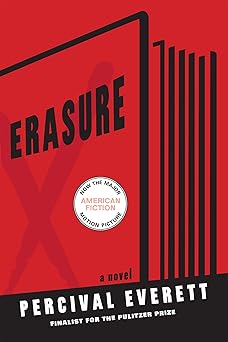
All Formats & Editions
🖋 Erasure by Percival Everett — A Fierce, Funny, Unflinching Look at Race, Identity, and the Stories We’re Allowed to Tell
Some books entertain, and then some books make you sit still with discomfort—and gratitude—for the mirror they hold up to the world.
Reading Erasure by Percival Everett was like being handed a puzzle box full of wit, rage, truth, and heartbreak and being told: “Take your time. But when you’re done, don’t pretend you’re unchanged.”
This novel isn’t quiet. It doesn’t whisper its message. It shouts, it laughs bitterly, and sometimes, it cries between the lines. And as someone who turns to literature not just to escape but to understand, I found Erasure absolutely unforgettable.
📚 A Story of One Man, Two Names, and a Thousand Compromises
At the heart of the novel is Thelonious “Monk” Ellison, a highly educated, Black academic and literary novelist who’s constantly told his work isn’t “Black enough.” His books don’t sell. He doesn’t fit the mould. And then he watches, in quiet horror, as a novel filled with racial clichés—We’re Lives in Da Ghetto—becomes a bestseller, celebrated for its “authentic” portrayal of Black life.
So Monk does what writers do best when they’re cornered: he writes. But what he writes is a full-blown, scathing parody—My Pafology—under the pseudonym Stagg R. Leigh. It’s offensive, exaggerated, and everything the publishing world seems to want from a Black author. And, of course… it becomes a runaway hit.
Now Monk is stuck—praised for something he despises, trapped between the truth he wants to write and the lie the world wants to hear. And all the while, he’s navigating profound personal loss—his sister’s murder, his mother’s Alzheimer’s, and the slow unravelling of his own identity.
🎭 Satire With a Pulse: Mood, Tone, and Themes
Everett’s writing is whip-smart and fearless. The tone of Erasure oscillates between biting satire and aching introspection, never letting you settle. One minute, you’re laughing out loud at a darkly comic line, and the next, you’re sitting in silence, realizing what that laugh really cost.
Here are the themes that resonated with me most:
🎯 Race, Identity, and the Performance of Authenticity
Erasure asks a question that cuts to the bone: Who gets to define what it means to be “authentically Black”? Monk’s identity is constantly interrogated—not just by publishers but by society. He’s too educated, too “whitewashed,” too himself to fit the narrative the world wants.
It made me think of how many of us, in big and small ways, perform pieces of ourselves to be accepted.
💸 Art vs. Commerce
What happens when the truth doesn’t sell—but the stereotype does? Monk’s parody is born of anger, but it quickly becomes the very thing he sets out to mock. And watching him navigate that success is painful, messy, and deeply human.
🧠 The Invisibility of Intellectual Black Men
Monk is brilliant. And invisible. His mind is his gift, but it also becomes a barrier between him and a world that wants something simpler and more digestible. This isn’t just a satire—it’s a protest against the Erasure of nuance in Black narratives.
💔 Family, Grief, and Emotional Distance
Beyond the satire, this book has a quiet, devastating core. Monk’s mother is fading into dementia. His family is fractured. And amidst all the noise, Monk is a man profoundly alone. Those moments—those silences between the satire—are where Erasure truly broke me.
💭 How It Made Me Feel
I’ll be honest—this wasn’t always an easy read. It made me uncomfortable. It challenged me. It made me rethink what I call “authentic” and why.
But it also made me grateful—for writers like Everett, who aren’t afraid to be angry, funny, or complicated. Who doesn’t apologize for being too smart or too layered? Who remind us that the stories that matter most are often the ones we try hardest not to hear.
Reading Erasure was like sitting across from someone who tells you the truth, even when it’s sharp, especially when it’s sharp.
📚 Who Should Read Erasure?
This novel is for readers who love books that don’t play safe. If you were moved by Invisible Man by Ralph Ellison, The Sellout by Paul Beatty, or Americanah by Chimamanda Ngozi Adichie—this belongs on your shelf.
If you care about art, identity, or the politics of who gets to tell which stories, Erasure will challenge you—and possibly change the way you see literature altogether.
And if you’re a writer, an artist, or anyone who’s ever been told to be more palatable, this book is your battle cry.
✍️ Final Thoughts
Percival Everett’s Erasure is not just a novel. It’s a mirror held up to the publishing world, to readers, and maybe even to ourselves.
It asks: What do we celebrate? What do we ignore? And what truths are we too afraid to tell?
With razor-sharp wit and heartbreaking honesty, Erasure reminds us that being seen doesn’t always mean being understood—and that sometimes, to speak your truth, you have to shout through a mask the world already expects.
If this sounds like your kind of story—one that doesn’t flinch doesn’t flatter, but demands to be reckoned with—please read Erasure. Let it shake something loose.
👉 📚 ByOneClick – One Click, Endless Stories.